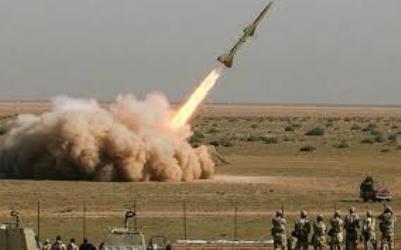
Nevertheless, there are some facts and strategic determinants that justify Iran’s missile program and thus, blur that image. These variables are the same components that most of the apparently realist western hemisphere experts, but not realistic realists, have forgotten deliberately to take them into account. Invisible prevailing of Waltzian distribution of power concept at the system level as a predominant framework of analyzing Iran foreign behaviors and therefore, ignoring the elements that Gideon Rose named them “Intervening Variables”, is the primary source of treating Iran’s missile program as an enormous threat. What are the intervening variables or realities that make Iran’s missile-based defensive thought meaningful?
1. Surrounded Island
Iran is the Middle East sole country that has surrounded by the US bases and after being a subject of an eight-year war with Iraq, has witnessed U.S. three times direct military action in its neighborhood. During and after the first Gulf War of 1991, the Pentagon dramatically expanded its presence in the region.
Hundreds of thousands of troops were deployed to Saudi Arabia in preparation for the war against Iraqi autocrat and former ally Saddam Hussein. At the peak of the military campaign in Afghanistan, the US Department of Defense operated about 800 bases that housed and fed as many as 100,000 soldiers a day. At the height of the American occupation of Iraq, the United States had 505 bases there, ranging from small outposts to mega-sized air bases. According to Time’s report, there are currently about 35,000 troops serving in the 20 nations in the Middle East region. And recently, Syria has become at least the 14th country in the Islamic world that U.S. forces have invaded or occupied or bombed, and in which American soldiers have killed or been killed since 1980.
Although abovementioned numbers have decreased significantly, but U.S. as a global superpower, currently has a huge amount of military capacity in the nearest points to Iran’s borders that suggests encirclement and being under threat perception between officials and pragmatic elites of Iran. Alongside U.S. several airbases in the Persian Gulf monarchies containing strategic bombers and advanced fighters and presence of its Fifth Fleet, incidents like capturing stealth drone RQ-170 on the Iran’s sky in 2011, has reinforced Iran assumptions.
2. Defense Spending
At the regional level, in comparison with its main opponent Saudi Arabia, Iran’s military budget seems very low relative to its population and indicates gradual reduction. Iran, as an 80 million nation, according to SIPRI Military Expenditure Database, has allocated 2.5% (about $ 10 billion) of its GDP to military affairs in 2015, which was 3.3% in 2005. In contrast, Saudi Arabia’s 29-million population, has increased its military budget of GDP from 7.7% in 2005 to 13.7% in 2015 (about $ 87 billion).
Enjoying western advanced and powerful military equipment and hosting foreign personnel by the region's kingdoms, is not an ignorable fact for Iran. Regarding obsolete fighter aircraft of Iran’s Air Force due to the United States embargo on weapon sales to Iran following 1979 revolution and the country’s vast territory, Tehran had no choice but its own initiatives and self-reliance to guarantee national security and deterrence power.
3. Foreign Invasions
Historically, during Iran-Iraq war, Saddam Hussein was supported by great powers such as US and Iran experienced his chemical and missile attacks on its civilians and cities.Furthermore, in 1988, U.S. navy warship targeted an Iranian passenger flight over its own territorial waters in the Persian Gulf and led to death of all 290 on board people. These tragic events that Iranians have not forgotten yet, in their point of view, were the consequence of lacking of enduring security-making instruments. They have been subject of several invasions and according to Thucydides’ formula “The strong do what they can: the weak suffer what they must”, do not want to suffer from weakness anymore.
4. Sense of Being Defenseless
As International community and its institutions did almost nothing in defending of Iran’s people during mentioned violations, as well as, historical remembrance of invasion of their country by the global powers during World Wars, they experienced Mearsheimer’s golden sentence that there is not any central authority above states to protect them from each other. So, this nation has learned its lessons very well and in a costly way, without any aggressive or retaliatory idea as at least the last century reveals.
5. Israel Factor
After proving the peaceful nature of Tehran’s nuclear program and concluding JCPOA (Joint Comprehensive Plan of Action) and the fact that Iran did take its related necessary steps at the beginning of implementation, now, U.S. is continuing a former procedure through introducing missile program as a new threat. In a turbulent region such as Middle East that powers like Israel exist while enjoying many nuclear warheads without any kind of supervision and binding legal and formal commitment to anywhere and anyone, the complete disarmament of Iran is a naive and impractical thought.
In spite of offensive realism prescription for pursuing regional hegemony through maximizing power, Iran is not seeking this decree and according to its officials, the missile program is defensive and deterrent. Alongside regional opponents, Tehran is facing with coalition of global powers which acting collectively on the every case related to Iran and the military option is still on the table.
As a result, analyzing Iran's missile activities through unshakeable presumptions and ignorance of any space for keeping its survival and security, will cause illusory findings. In the framework of realistic dealing with this issue, tracing its origins and touching the realities is more productive than having exclusively Waltzian systemic attitude and considering Iran as a disruptive unit.
By: Fardin Eftekhari, MA International Relations
**1771
www.irna.ir
 solhkhabar | Peace International News Agency Peace International News Agency , Peace News , International Agency News of Peace
solhkhabar | Peace International News Agency Peace International News Agency , Peace News , International Agency News of Peace